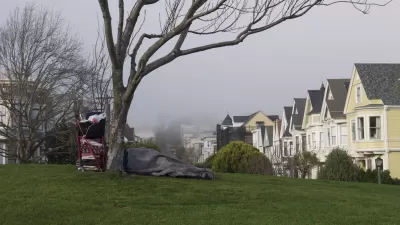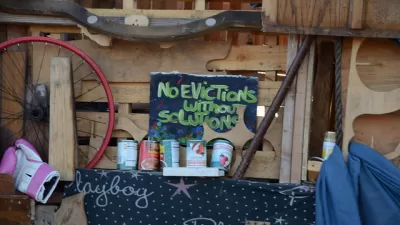And stop changing the subject, adds the Editorial Board of the San Francisco Chronicle.

The editorial board of the San Francisco Chronicle issued a pro-housing development challenge in no uncertain terms this week, using a recent study from UCLA that traced the connection between lack of housing supply, high housing prices, and increasing homelessness as its main source of evidence.
After listing study after study that shifts blame toward the housing market and away from 'complex social pathologies, drug usage, or deficiencies in mental health treatments,' the editorial puts the responsibility for the state's homeless crisis on the politicians, property owners, and special interests who control land use in the state:
To acknowledge the housing shortage as essential to homelessness is to connect its cruelties to every Californian who objects to more housing in his or her neighborhood and every politician who defers to such demands. Perhaps that’s why we hear so much about the other causes of homelessness.
FULL STORY: Editorial: To help homeless, more housing is the answer

Maui's Vacation Rental Debate Turns Ugly
Verbal attacks, misinformation campaigns and fistfights plague a high-stakes debate to convert thousands of vacation rentals into long-term housing.

Planetizen Federal Action Tracker
A weekly monitor of how Trump’s orders and actions are impacting planners and planning in America.

In Urban Planning, AI Prompting Could be the New Design Thinking
Creativity has long been key to great urban design. What if we see AI as our new creative partner?

King County Supportive Housing Program Offers Hope for Unhoused Residents
The county is taking a ‘Housing First’ approach that prioritizes getting people into housing, then offering wraparound supportive services.

Researchers Use AI to Get Clearer Picture of US Housing
Analysts are using artificial intelligence to supercharge their research by allowing them to comb through data faster. Though these AI tools can be error prone, they save time and housing researchers are optimistic about the future.

Making Shared Micromobility More Inclusive
Cities and shared mobility system operators can do more to include people with disabilities in planning and operations, per a new report.
Urban Design for Planners 1: Software Tools
This six-course series explores essential urban design concepts using open source software and equips planners with the tools they need to participate fully in the urban design process.
Planning for Universal Design
Learn the tools for implementing Universal Design in planning regulations.
planning NEXT
Appalachian Highlands Housing Partners
Mpact (founded as Rail~Volution)
City of Camden Redevelopment Agency
City of Astoria
City of Portland
City of Laramie





























